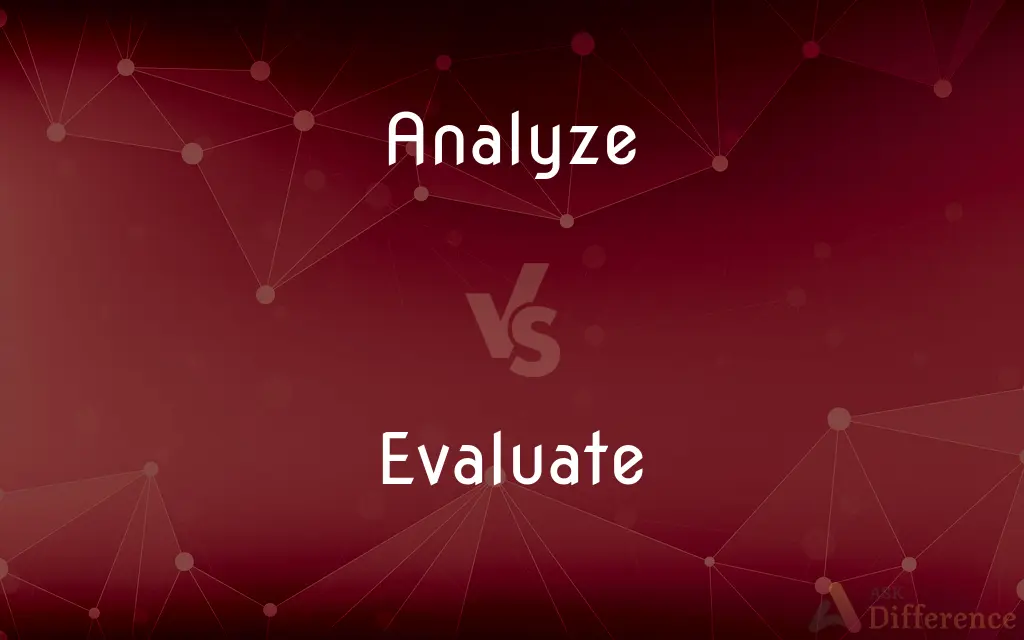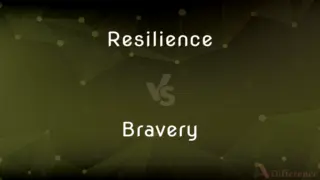Analyze vs. Evaluate — What's the Difference?
By Tayyaba Rehman — Updated on October 26, 2023
Analyze means to examine in detail, while evaluate means to judge the value or worth of something.

Difference Between Analyze and Evaluate
Table of Contents
ADVERTISEMENT
Key Differences
Analyze involves breaking down complex information into simpler parts. Evaluate involves assessing or judging those parts.
When you analyze, you dissect or study elements closely. When you evaluate, you make a judgment or appraise those elements.
Analysis often precedes evaluation. After analysis, evaluation often follows.
Analysis is about understanding structure and relationships. Evaluation is about determining quality or value.
Analyzing is like investigating the pieces of a puzzle. Evaluating is like deciding how well those pieces fit together.
ADVERTISEMENT
Comparison Chart
Definition
Examine in detail
Judge value or worth
Focus
Dissecting, studying elements
Assessing, appraising elements
Sequence
Often precedes evaluation
Often follows analysis
Objective
Understanding structure, relationships
Determining quality, value
Analogy
Investigating puzzle pieces
Deciding how well pieces fit together
Compare with Definitions
Analyze
To investigate systematically.
The team analyzed the software’s performance.
Evaluate
To review or examine critically.
Critics evaluate new movies.
Analyze
To break down into components.
She analyzed the poem’s structure.
Evaluate
To judge the value or worth.
They evaluate the effectiveness of the program.
Analyze
To study the elements of something.
He analyzed the market trends.
Evaluate
To gauge or measure.
Researchers evaluate the impact of the policy.
Analyze
To examine in detail.
Scientists analyze data from experiments.
Evaluate
Form an idea of the amount, number, or value of; assess
The study will assist in evaluating the impact of recent changes
A system for evaluating how well the firm is performing
Analyze
To examine methodically by separating into parts and studying their interrelations.
Evaluate
Find a numerical expression or equivalent for (an equation, formula, or function)
Substitute numbers in a simple formula and evaluate the answer
Analyze
(Chemistry) To make a chemical analysis of.
Evaluate
To ascertain or fix the value or amount of
Evaluate the damage from the flood.
Analyze
(Mathematics) To make a mathematical analysis of.
Evaluate
To determine the importance, effectiveness, or worth of; assess
Evaluate teacher performance.
Analyze
To psychoanalyze.
Evaluate
(Mathematics) To calculate the numerical value of; express numerically.
Analyze
(transitive) To subject to analysis.
Evaluate
(transitive) To draw conclusions from examining; to assess.
It will take several years to evaluate the material gathered in the survey.
Analyze
(transitive) To resolve (anything complex) into its elements.
Evaluate
To compute or determine the value of (an expression).
Evaluate this integral.
Analyze
(transitive) To separate into the constituent parts, for the purpose of an examination of each separately.
Evaluate
To return or have a specific value.
Analyze
(transitive) To examine in such a manner as to ascertain the elements or nature of the thing examined; as, to analyze a fossil substance, to analyze a sentence or a word, or to analyze an action to ascertain its morality.
Evaluate
To fix the value of; to rate; to appraise.
Analyze
To subject to analysis; to resolve (anything complex) into its elements; to separate into the constituent parts, for the purpose of an examination of each separately; to examine in such a manner as to ascertain the elements or nature of the thing examined; to consider in detail in order to discover essential features or meaning; as, to analyze an action to ascertain its morality; to analyse a sonnet by Shakespeare; to analyse the evidence in a criminal trial; to analyse your real motives.
No one, I presume, can analyze the sensations of pleasure or pain.
Evaluate
Place a value on; judge the worth of something;
I will have the family jewels appraised by a professional
Analyze
Make a mathematical, chemical, or grammatical analysis of; break down into components or essential features; as, to analyse a specimen; to analyze a fossil substance; to analyze a sentence or a word; to analyse a chemical compound.
Evaluate
To assess or appraise.
Teachers evaluate students' work.
Analyze
Subject to psychoanalytic treatment.
Evaluate
To determine quality or importance.
Managers evaluate employee performance.
Analyze
Consider in detail and subject to an analysis in order to discover essential features or meaning;
Analyze a sonnet by Shakespeare
Analyze the evidence in a criminal trial
Analyze your real motives
Analyze
Make a mathematical, chemical, or grammatical analysis of; break down into components or essential features;
Analyze a specimen
Analyze a sentence
Analyze a chemical compound
Analyze
Break down into components or essential features;
Analyze today's financial market
Analyze
Subject to psychoanalytic treatment;
I was analyzed in Vienna by a famous psychiatrist
Analyze
To dissect for understanding.
Researchers analyze soil samples for nutrients.
Common Curiosities
What does analyze mean?
Analyze means to examine or study something in detail.
Can you analyze without evaluating?
Yes, you can analyze (examine) something without making a judgment.
What does evaluate mean?
Evaluate means to assess or judge the value or worth of something.
What is the first step, analyze or evaluate?
Usually, you analyze first, then evaluate.
Are analyze and evaluate the same?
analyze is about examining, while evaluate is about judging.
Where is evaluate commonly used?
Evaluate is commonly used in educational, business, and review contexts.
Is evaluate about understanding structure?
Evaluate is more about judging quality, not understanding structure.
Is evaluation possible without analysis?
Typically, evaluation follows analysis, but it’s possible to evaluate without detailed analysis.
Does evaluate involve making decisions?
Yes, evaluate often involves making decisions based on judgments.
Does analyze involve judgment?
Analyze involves examination, not necessarily judgment.
Can analyze lead to conclusions?
Analyze can lead to understanding, which may inform conclusions.
Can you analyze a theory?
Yes, you can analyze a theory by examining its components.
In what contexts is analyze used?
Analyze is used in scientific, academic, and investigative contexts.
Can you evaluate an argument?
Yes, you can evaluate an argument by judging its validity or strength.
Are both terms used in scientific research?
Yes, both analyze and evaluate are used in scientific research for different purposes.
Share Your Discovery

Previous Comparison
Resilience vs. Bravery
Next Comparison
Civic vs. CivilAuthor Spotlight
Written by
Tayyaba RehmanTayyaba Rehman is a distinguished writer, currently serving as a primary contributor to askdifference.com. As a researcher in semantics and etymology, Tayyaba's passion for the complexity of languages and their distinctions has found a perfect home on the platform. Tayyaba delves into the intricacies of language, distinguishing between commonly confused words and phrases, thereby providing clarity for readers worldwide.













































